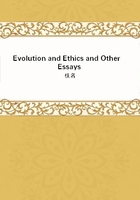
第19章
What is often called the struggle for existence in society (I plead guilty to having used the term too loosely myself), is a contest, not for the means of existence, but for the means of enjoyment. Those who occupy the first places in this practical competitive examination are the rich and the influential; those who fail, more or less, occupy the lower places, down to the squalid obscurity of the pauper and the criminal. Upon the most liberal estimate, I suppose the former group will not amount to two per cent. of the population. I doubt if the latter exceeds another two per cent.; but let it be supposed, for the sake of argument, that it is as great as five per cent.
Those who read the last Essay in this volume will not accuse me of wishing to attenuate the evil of the existence of this group, whether great or small.
As it is only in the latter group that any thing comparable to the struggle for existence in the state of nature can take place; as it is only among this twentieth of the whole people that numerous men, women, and children die of rapid or slow starvation, or of the diseases incidental to permanently bad conditions of life; and as there is nothing to prevent their multiplication before they are killed off, while, in spite of greater infant mortality, they increase faster than the rich; it seems clear that the struggle for existence in this class can have no appreciable selective influence upon the other 95 per cent. of the population.
What sort of a sheep breeder would he be who should content himself with picking out the worst fifty out of a thousand, leaving them on a barren common till the weakest starved, and then letting the survivors go back to mix with the rest? And the parallel is too favourable; since in a large number of cases, the actual poor and the convicted criminals are neither the weakest nor the worst.
In the struggle for the means of enjoyment, the qualities which ensure success are energy, industry, intellectual capacity, tenacity of purpose, and, at least, as much sympathy as is necessary to make a man understand the feelings of his fellows. Were there none of those artificial arrangements by which fools and knaves are kept at the top of society instead of sinking to their natural place at the bottom, the struggle for the means of enjoyment would ensure a constant circulation of the human units of the social compound, from the bottom to the top and from the top to the bottom. The survivors of the contest, those who continued to form the great bulk of the polity, would not be those "fittest" who got to the very top, but the great body of the moderately "fit," whose numbers and superior propagative power, enable them always to swamp the exceptionally endowed minority.
I have elsewhere lamented the absence from society of a machinery for facilitating the descent of incapacity.
"Administrative Nihilism." Collected Essays, vol. i. p. 54.